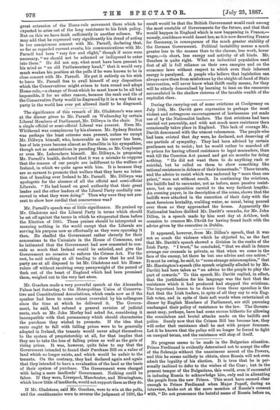It appeared, however, from Mr. Dillon's speech, that it was
not so much the violence which he objected to; as the fact that Mr. Davitt's speech showed a division in the ranks of the Irish Party. "I trust," he concluded, "that we shall in future arrange our counsels in private, so that when we come in the face of the enemy, let there be but one advice and one action." It must be owing, he said, to "some strange misconception," that Mr. Harrington's speech (the speech originally alluded to by Mr. Davitt) had been taken as " an advice to the people to play the part of cowards." To this speech Mr. Devitt replied, in effect, that the justification for his language was the fact that the resistance which it had produced bad stopped the evictions. The important lesson to be drawn from these speeches is the fact that the Irish leaders, in spite of all they say to win Eng- lish votes, and in spite of their soft words when entertained at dinner by English Members of Parliament, are still pursuing unchanged their policy of resistance to the law. The Govern- ment may, perhaps, have had some excuse hitherto for allowing the scandalous and brutal attacks made on the bailiffs and police. Surely now that the Crimes Bill has become law, they will order that resistance shall be met with proper firmness. Let it be known that the police will no longer be forced to fight on unequal terms, and the resistance will stop of itself.


































 Previous page
Previous page